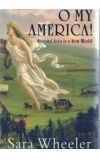
11 Apr 2013 01:40:57
On beginning the book Wheeler herself knew "a little about the conflicting demands of motherhood, economics and sanity". More precisely, she knew how it felt "not being taken seriously, not earning enough money, not building enough Lego" – and she was approaching 50, "a tough age". As she says, "role-models are rare for women contemplating a second act" and yet she has found six of them – the most famous being Fanny Trollope, mother of Anthony.
Though Wheeler's emphasis is on her heroines' journeys, she also describes the one she went on through America herself in order to do her research. Every so often the narrative zooms from the past to the 21st century in which Wheeler locates herself "in a parking lot, hunched over two flapping maps" (one from the 1880s and one from the present day), or walking past "a hair salon on a coast road", where "women with foil on their heads sat under dryers". Wheeler has the novelist Anne Tyler's eye for the comedy of humdrum detail, and for the poignancy of human aspiration. When in Kentucky with her family, staying at Wigwam Village ("built in the 50and still furnished with the original formica"), she meets a "35-year-old receptionist…recently arrived from Calcutta" who "yearned for New York or Chicago. 'This,' he said, gesturing towards the straggly highway and a dog engaged with an upturned trash can, 'was not the America I had in mind.'"
The six historical portraits are precise as clocks and each as compelling as the last. Wheeler's epigrammatic style – "Fanny Trollope was broke when she turned 50, and on intimate terms with pig manure" – is ideally suited to biographical sketches, which, though they can't portray the whole truth of their subjects, convey in all their glory those parts of it that suit her theme of re-invention. Though each of the women met with disappointment and hardship, each was resilient – and witty. Fanny Trollope, for example, confessed that she would have liked Cincinnati much better, "if the people had not dealt so very largely in hogs".
Wheeler is consistently deft both at conveying atmosphere and character. When she describes Fanny Trollope leaving London for Ohio, she tells us all we might care to know about the gossips: '"I can scarcely believe,' one acquaintance wrote to another, 'that Mrs T is actually on her way and Trollope in his old age alone in London.'" "Will wonders never cease?" wrote a second. And Fanny Kemble, the second of Wheeler's subjects, is rendered all too vividly in her disappointment. Determined to make a go of her new life in Georgia, she "laid on a Fourth of July feast – pleased with herself for rising above any feelings of hurt English pride" but "the quakers said it was a waste of a good working day".
Though she gives each of her subjects distinct life, Wheeler's purpose is not solely biographical; each woman also serves to illuminate a different facet of the America she found, whether in Illinois, Kentucky, or California. And, while Wheeler relishes their subjective accounts, she also claims her own cooler perspective. When Harriet Martineau writes home about America "with determined bombast", describing the spirit of "Liberty" as a "clear-eyed Presence majestically passing through the land which is soon to be her throne", Wheeler interjects: "It was not going to be all that soon, and there was not going to be anything at all majestic about it."
O My America takes its title from a line in John Donne's poem, To His Mistress Going to Bed, in which the speaker exclaims, "O, My America, my Newfound land" on seeing the naked body of his mistress. Though the book is free of erotic adventure, it's a surprisingly apt title for a book about swerving the focus of libido from love to adventure.

